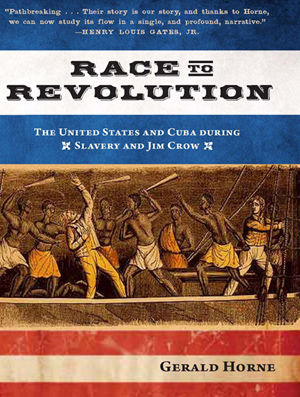
To his credit, the first African-American president, Barack Obama, recently took a bold step towards normalizing relations between the United States and Cuba, thereby challenging a decades-long failed policy intent on isolating the island nation. Undoubtedly, with this change in U.S. foreign policy, there will likely be a renewed interest in both nations’ shared history.
That an African American took the initiative in spearheading this long overdue policy change is also important, as it is only the most recent illustration of a unique relationship between Blacks in the “slaveholders’ republic” and their African kin in Cuba, the renowned slave depot and former Spanish colony.
Gerald Horne’s “Race To Revolution: The United States And Cuba During Slavery And Jim Crow” is a monumental accomplishment, a welcomed, insightful contribution to an understanding of this unique relationship.
With voluminous amounts of research and citation, Horne builds a narrative spanning two centuries. He connects U.S. annexation of Florida and Texas to the expansion of slavery, British supported abolitionism in the Caribbean as a strategic move to possibility regain control of her former colonies, and Spanish colonial decline – in Cuba, as well as Mexico and Columbia – as part of a world-wide realignment of political power towards Washington, slavery and Jim Crow.
Further, Horne writes, “…considering that both Mexico and Columbia – where those of African descent [now] played leading roles – were considering annexing Cuba” posed an “existential threat to one of the most significant investment opportunities in the republic: slavery.” Hence, the republics’ flanking maneuver, as the annexation of Texas – a Mexican state – ultimately become another front in the on-going war against abolition.
“In retrospect, it is easy to infer that Washington’s burgeoning desire to dismember Mexico was driven in part by the latter’s abolitionism and its allied plans for Cuba,” Horne concluded. In other words, he added, the message should be clear: “…cross Washington, back abolition, and run the risk of dismemberment.”
The apolitical mischaracterization of rugged settlers simply struggling to make a new life in Texas – exemplified by the History Channel’s recent show Texas Rising – takes on a new, more sinister meaning when viewed through this lens. For, it was partly the contest between slavery and abolition – a context often obscured – that ultimately justified the taking of the former Mexican state – not only to consolidate slavery in Texas, but to consolidate it in Cuba as well.
That Cuba could potentially become an independent state lead by former slaves was simply out of the question. As Horne writes, this “other alternative…was too ghastly to contemplate” to slave holders, as they did not want “another Haiti” just miles from their shores.
That Haiti’s former slaves had recently dispatched their former masters – with a justifiable bloodletting – only added to the republics paranoia. Blacks fleeing Florida – and “the racist reign of terror” – often stopped first in Cuba. Many viewed the island as a staging ground for returning African Americans with hopes of freeing their still enslaved brethren – and embarking on their own justifiable bloodletting.
That London was heading towards abolition — fomenting revolt and arming Blacks, first in Florida and then in the Caribbean as slavery was expanding in the South — was also problematic for the “slaveholders’ republic,” as slave owners feared free and armed Blacks, aided by British troops, setting up camp just miles from their shores.
John Quincy Adams, undoubtedly, spoke for many of the time when he noted that Cuba was “the keystone to our Union. No American statesman ought to ever withdraw his eyes from it.”
Horne’s narrative tells us why.
Horne writes, Cuba could very easily be viewed as a “staging ground for attack on the mainland” by the British – who were undoubtedly still reeling from the loss of her colonies in 1776, and the stalemate in the just-concluded War of 1812 – in league with former slaves.
Further, “Cuba was a strategic chokepoint, controlling commerce east and west of the mainland and acting as a plug for the basin of the Mississippi River, the circulatory system of a good deal of North America. He who held Cuba potentially also had a firm grip on the throat of the mainland,” Horne wrote.
Jostled by world powers – with very different perspectives on slavery, and later Jim Crow and capitalism – Cuba was often stuck in a vice.
As Horne writes, “Spanish Cuba was trapped between (and among) Haiti and the United States and Britain, all with dreams of their own as to how this pistol-shaped island should evolve. That Madrid felt compelled to appeal to U.S. nationals was emblematic of the reality that Cuba was far from Spain but close to the mainland republic, and like metal filings to a magnet Havana seemed to be drifting inexorably toward the stars and stripes,” if only temporarily.
Horne’s “Race To Revolution: The United States And Cuba During Slavery And Jim Crow” is a must read, especially now, as U.S. policy makers renew relations with the independent and socialist Cuba.
Like Horne’s “Negro Comrades of the Crown: African Americans and the British Empire Fight the U.S. Before Emancipation,” “The Counter-Revolution of 1776: Slave Resistance and the Origins of the United States of America,” and his forthcoming “Confronting Black Jacobins : The U.S., the Haitian Revolution, and the Origins of the Dominican Republic,” Race To Revolution tells a story that needs to be told, redefining our nation’s contradictory relationship to freedom, democracy, slavery, Jim Crow and human rights.
Race To Revolution: The United States And Cuba During Slavery And Jim Crow
By Gerald Horne
Monthly Review Press, 2014, 429 pages

MOST POPULAR TODAY

Zionist organizations leading campaign to stop ceasefire resolutions in D.C. area


High Court essentially bans demonstrations, freedom of assembly in Deep South

Afghanistan’s socialist years: The promising future killed off by U.S. imperialism

Communist Karol Cariola elected president of Chile’s legislature






Comments